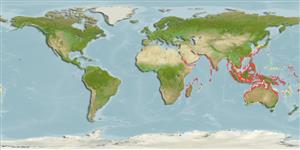>
Eupercaria/misc (Various families in series Eupercaria) >
Lutjanidae (Snappers) > Lutjaninae
Etymology: Lutjanus: Malay, ikan lutjan, name of a fish.
More on author: Bloch.
Environment: milieu / climate zone / depth range / distribution range
ນິເວດວິທະຍາ
ສັດທະເລ ກ່ຽວກັນຫີນ; ລະດັບຄວາມເລິກ 10 - 30 m (Ref. 9710). Tropical
Indo-West Pacific: widespread; from South Africa to the Philippines; north to Japan. Records from the Middle East, including the Red Sea, refer to L. sapphirolineatus.
ຂະໜາດ / ນ້ຳໜັກ / Age
Maturity: Lm ? range ? - ? cm
Max length : 30.0 cm TL ຕົວຜູ້/ບໍ່ມີເພດ; (Ref. 55); common length : 20.0 cm TL ຕົວຜູ້/ບໍ່ມີເພດ; (Ref. 55)
ຄີ (ໜາມ)ແຂງຢູ່ຫຼັງປາ (ທັງໝົດ) : 11; ຄີຫຼັງຂອງປາ (ຄີອ່ອນ) (ທັງໝົດ) : 13 - 14; ຄີ(ໜາມ) ແຂງຢູ່ຄີກົ້ນປາ
ກຸ່ມປາກະດູກແຂງ
ຄວາມຖີ່ຂອງກຸ່ມຖ່າຍທອດພັນ
ປາທີ່ມີການເຄື່ອນຍ້າຍຈາກທະເລໄປຫານ້ຳຈືດ ແລະນ້ຳຈືດຫາທະເລ
ປາທີ່ມີການເຄື່ອນຍ້າຍຈາກທະເລແລະໄປໄຂ່ຢູ່ນ້ຳຈືດ
ຄີກົ້ນຂອງປາ
ສັດທີ່ມີກະດູກສັນຫັຼງ
ການຖ່າຍທອດທາງກຳມະພັນຈາກພໍ່ແມ່ຫາລູກ: 3; ຄີກົ້ນຂອງປາ: 8. This species is distinguished by the following characters: D XI,13 or 14 (usually 13); A III, 8; pectoral-fin 16 or 17; lateral-line scales 47-50; horizontal scale rows above the lateral line 8 or 9; scale rows above lateral line rising obliquely toward dorsal profile; predorsal scales extending forward nearly to level of just above anterior edge of orbit; scale rows on cheek 8-11; without subocular extension of cheek scales; gill rakers on first arch 7 or 8 + 15-17 = 22-25; tongue is smooth, toothless; preopercular notch developed just above angle; interopercular knob inconspicuous; the first blue stripe is running from above anterior edge of eye and ending below the 7?9th dorsal-fin spine base; third stripe usually running from middle of upper part of opercle or anterior edge of upper opercle to below posterior fourth of soft portion of dorsal fin, reaching the last soft dorsal-ray base (Ref. 110188).
Adults mainly inhabit coral and rocky reefs (Ref. 30573). They sometimes form small aggregations around rocky outcrops and coral heads during daylight hours. Feed on fishes and crustaceans (Ref. 30573).
Life cycle and mating behavior
Maturities | ການສືບພັນ | Spawnings | Egg(s) | Fecundities | ຕົວອ່ອນ
Iwatsuki, Y., J.M. Al-Mamry and P.C. Heemstra, 2016. Validity of a blue stripe snapper, Lutjanus octolineatus (Cuvier 1828) and a related species, L. bengalensis (Bloch 1790) with a new species (Pisces; Lutjanidae) from the Arabian Sea. Zootaxa 4098(3):511-528. (Ref. 110188)
IUCN Red List Status (Ref. 130435)
Threat to humans
Harmless
Human uses
ການປະມົງ: ເປັນສີນຄ້າ
ເຄື່ອງມື
Special reports
Download XML
ແຫຼ່ງອີນເຕີເນັດ
Estimates based on models
Preferred temperature (Ref.
123201): 26.7 - 29.3, mean 28.6 °C (based on 460 cells).
Phylogenetic diversity index (Ref.
82804): PD
50 = 0.5000 [Uniqueness, from 0.5 = low to 2.0 = high].
Bayesian length-weight: a=0.01479 (0.00706 - 0.03101), b=2.97 (2.81 - 3.13), in cm total length, based on LWR estimates for this Genus-body shape (Ref.
93245).
ຊັ້ນເຂດຮ້ອນ (Ref.
69278): 3.9 ±0.63 se; based on food items.
ຄວາມຢືດຢຸ່ນ (Ref.
120179): ຂະໜາດກາງ, ປະຊາກອນຕຳ່ສຸດທີ່ໃຊ້ເວລາສອງເທົ່າ 1.4 - 4.4 ປີ (Preliminary K or Fecundity.).
Fishing Vulnerability (Ref.
59153): Low vulnerability (20 of 100).
Nutrients (Ref.
124155): Calcium = 49.3 [32.8, 71.2] mg/100g; Iron = 0.385 [0.243, 0.594] mg/100g; Protein = 18.5 [17.0, 19.8] %; Omega3 = 0.133 [0.092, 0.189] g/100g; Selenium = 47.9 [31.5, 71.7] μg/100g; VitaminA = 168 [30, 630] μg/100g; Zinc = 0.523 [0.410, 0.729] mg/100g (wet weight);
